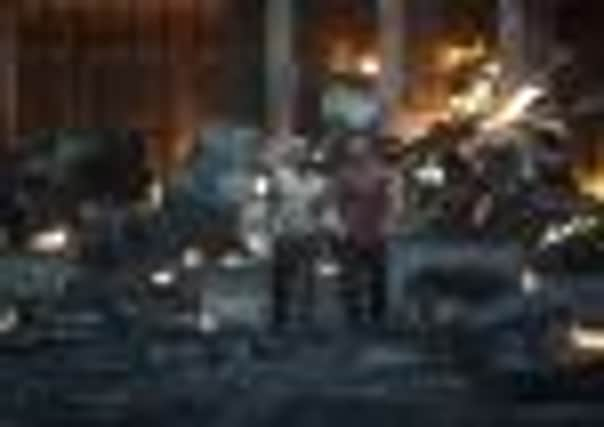A Good Day To Die Hard is hard to stomach


A Good Day To Die Hard (12A)
Directed by: John Moore
Starring: Bruce Willis, Jai Courtney, Sebastian Koch, Mary Elizabeth Winstead
*
Ever since the first sequel to the greatest American action film of the past 25 years arrived with the titular addendum Die Harder, one of the more curious pleasures of this rather needless franchise has been witnessing the ridiculous lengths to which the studio will go to insert the words “Die Hard” into the title. Die Hard With A Vengeance was, admittedly, amusingly playful, working as both a functional description of the film (it was a Die Hard movie, it did feature some vengeance) and a statement of intent after the disappointing Die Hard 2 (Die Hard was back, with a vengeance). The belated Live Free or Die Hard on the other hand was so cheesy, it was streamlined to the more techie-sounding Die Hard 4.0 for its British release – though given the way it resembled a Pierce Brosnan Bond film, perhaps “Die Hard Another Day” would have been more appropriate.
Advertisement
Hide AdAll of which brings us to the latest instalment: the farcical-sounding A Good Day to Die Hard. As titles go, it’s pretty bad. In fact the marketing department already seem to have lost confidence in it, judging from the way the ads currently carpet-bombing your TV screens have reduced the font size of the first four words to the point where only “Die Hard” remains visible.
The irony of this is that the film is the least Die Hard-like enterprise in the franchise. Bruce Willis may be back as John McClane, but for the first 30 minutes or so he appears to have wandered into a Bourne film. As he tracks his estranged son Jack (Jai Courtney) to Russia and discovers that, far from being the drug-dealing reprobate he thought he was he’s actually a covert CIA agent, the film mimics Bourne’s now ubiquitous, hand-held, shot-on-the-fly mock-doc look. Directed by John Moore (best known for remaking The Omen), the results are a little disconcerting, not least because while the spy stuff is proficient if generic, Willis appears to be taking the prospect of playing an ageing action hero seriously. He even has a couple of thoughtfully handled scenes with Mary Elizabeth Winstead, briefly reprising her role from the previous film as McClane’s daughter Lucy.
In other words, it’s not awful; it’s just not Die Hard. The tone is wrong, the mood is too heavy and the action is too muted. Unfortunately, as soon as the film tries to get its Die Hard on, it goes too far in the other direction and becomes a limp parody of everything that was great about the first movie.
This happens the moment McClane interrupts what he thinks is his son’s attempt break to out of prison, but actually is a covert operation designed to extradite a Russian political prisoner (Sebastian Koch). Once again, McClane is the wrong guy in the wrong place at the wrong time. The difference now is that his presence wrecks the operation, gets Jack’s partner killed and ultimately enables the bad guys to put their master plan – involving weapons grade uranium and some hooey about Chernobyl – into action.
This last plot hole gets glossed over somewhat as the film quickly sets about re-establishing McClane’s heroic credentials. Thus we see him lay waste to half of Moscow in a truck, bond with Jack via their shared love of killing bad guys, and glibly reinforce his status as “just another American cowboy” with a series of inane, 12A appropriate wisecracks and catchphrases (“I’m just on vacation,” is the most overused).
As with Die Hard 4.0, the vest – like the cursing – has been retired from active service, but little nods to the first movie come thick and fast, whether it’s McLane showering bad guys in broken glass, laughing maniacally to distract a goon from shooting him, jumping off another exploding building, or getting irritated at yet another family member refusing to respect his patriarchal status (Jack calls McClane “John”, not “Dad”). The chief bad guy even attempts to dupe the McClanes by pulling a “Bill Clay” and pretending to be someone he’s not.
It’s woeful stuff.
Advertisement
Hide AdThe rote familial conflict lacks any of the emotional resonance that McClane’s relationship with his wife brought to the first film. Meanwhile, the anonymous Euro villains – among them a tap-dancing Russian who barks commands to his henchmen in English – are pale shadows of Alan Rickman’s deliciously malevolent Hans Gruber. Indeed, this is so far removed from the spirit of that film that it’s impossible not to spend the majority of its mercifully short running time wondering why they’re bothering to call it Die Hard at all. And then, just as the bad guys’ nefarious plan is inevitably revealed to be cover for a heist (what a shocker), the film supplies the answer.
“It’s about money?” asks Courtney’s dismayed Jack.
“When’s it not about money?” smirks Willis.